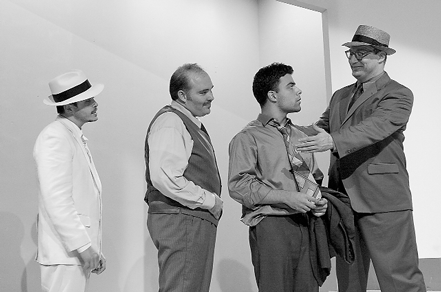Nelson Rodrigues’ 1960 play about media manipulation remains chilling
Aren’t scandals fun? The salacious details, the shocking revelations, the anticipation of getting the next installment in tomorrow’s paper or newscast? With scandal, truth takes a back seat, and we put down the paper or switch the channel having had a cheap fix and go about our lives waiting only to see what the next story will be.
Whether it’s Jen or Ben or Brad, the Catholic Church, Enron, or Brownie, our culture consumes this material mindlessly, giving each equal weight while it’s in front of us, and forgetting it when it’s moment has passed. Stories about Darfur, famine, and the failures of a corrupt administration get squeezed out because their importance may be high, but their sales value is low. The media is, after all, a business, and what keeps the masses tuned in is the constant parade of scandal, shock, and today’s person to hate. It won’t stop, because it sells. The media is also capable of doing great good, when it can engage a story and the public, but for the tabloid press it is outrage that sells, and—sadly—it can be manufactured, as needed.
That’s the theme of the exciting play “The Asphalt Kiss” by Nelson Rodrigues, now getting its U.S. premiere as part of a month-long festival of the author’s work. Rodrigues knows whereof he speaks, having worked in Brazil’s tabloid world, and his play is a noir fable about how a created story in a popular paper destroys a family. It is also a fable about the popular willingness to accept the truth of whatever the media provides. This unquestioning credulousness is what gives the media its power. Today, Fox News and the Weekly World News—the supermarket rag that shows pictures of the aliens invading your backyard—are equally adept at invention, though the former clears a threshold hurdle credibility, in part because it is far more sophisticated at spinning its tales. And liberals too have shown themselves to be adept at spinning. With such polarized reporting and commentary, truth is subsumed to ego, and a lot of people getting are getting rich by it.
In “The Asphalt Kiss,” the guy getting rich is the publisher Cunha, whose newspaper titillates the public on a daily basis. He has watched a man being run down by a bus—something my friends in Rio say is quite likely—who is dying in the street. Another man Arandir rushes to the injured man’s side. The injured man, unheard by anyone else, asks for a kiss as he is dying and Arandir complies. Cunha, with the help of the police, blows this story into a spectacle that destroys Arandir and his family and exposes dark secrets. The tragedy is that Cunha, concerned with nothing but selling papers, has the power to dictate truth, simply by printing it—and even those closest to Arandir begin to doubt their knowledge of a man they have known and loved for years.
That we are so willing to believe whatever is fed to us by media seems like a new phenomenon, but this play was written in 1960. It shares, with the plays of the period especially the earliest Edward Albee plays, a skewed sense of reality and a clear echo of the absurdist stage. For its grim subject matter, it has an internal lyricism that gives the script a fluidity and theatricality that is consistently invigorating. Visually, the play has been staged as a kind of “True Crime” comic with characters framed in various areas on the wonderful monochromatic set by Lauren Helpern. Traci Klainer’s accomplished lighting and Wade Laboissioniere’s costumes use striking and saturated colors to complete the look.
The cast is extraordinary. Paul De Sousa as Cunha elicits an appropriate level of creeps. James Martinez as Arandir is both powerful and sweet and Jessica Kay as Selminha, Arandir’s wife, is exceptional. The rest of the company does a wonderful job, particularly Dawn McGee in a variety of roles that help establish and create the world crumbing around Arandir and his family.
Sarah Cameron Sunde’s direction is solid, but could be stronger at the end; yet the play is a powerful experience with a sustained tension throughout that keeps the horrors unfolding.
gaycitynews.com


































